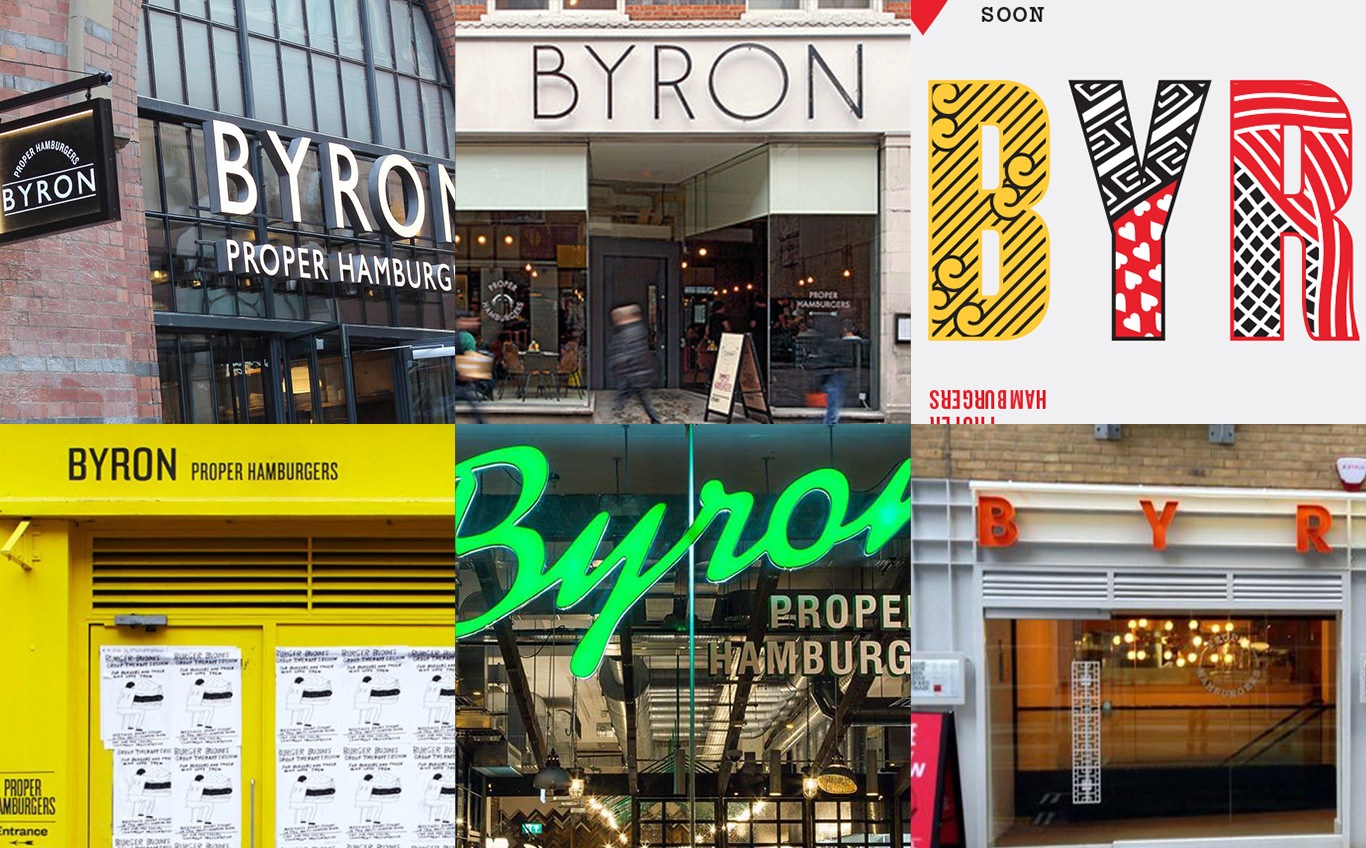
Written by Katie Lamberg in Branding

Branding has changed immensely over the last decade. Gone are the soulless, huge corporations with rigid guidelines, initially created to help achieve consistent brand rollout across multiple locations. In their place are more fluid, relaxed and customer-centric brands. The change has been brought about by us, the consumer. We no longer accept a one size fits all approach and strive to find brands that connect to us in a much more human way.
The fixed ways of the past don't allow modern brands to showcase their individuality and so they've evolved into brands that break the rules. One such brand is Byron. A brand that's now well established across the UK with over 35 locations, yet their restaurants don't seem to follow a traditional brand format. Each restaurant is unique, especially the exterior. Different colours, fonts, signage, everything. In fact, the only consistent elements are the burgers and the brand name. The brand designer responsible is quoted as saying, "With nothing to say and nothing to show, my approach was to treat each restaurant as if it was the only one." His thinking behind this was that the owners didn't want to show the typical burger photography, with the mundane 'fresh' descriptive. Something that can be seen on every high street throughout the UK. The Byron outcome is what is frequently described as unbranding. By creating each restaurant as an individual project, it has created a much more connected experience for the consumer. Restaurants that are designed to fit seamlessly into their environment and match the requirements of the consumers around them.
Unbranding isn't for every brand, yet we can certainly learn a lot from it
The days of huge corporate stores with the same clinical interiors are over, consumers want personality, a story, something to connect with. You need to find out what makes your audience tick, their wants, and needs, and then adapt your brand accordingly. It's less about a logo, fonts and corporate colourways, and more about engaging your audience in the way they demand.
Unbranding isn't just a free for all approach, it does need planning and parameters
Just letting loose can create a brand style that is totally unrecognisable and disparate. It needs to be created sensitively and with a big vision approach. There needs to be elements that connect the (un)brand, such as the food at Byron. Just creating 35 restaurants across the UK with different branding and unique menus wouldn't work. The restaurants are connected with their food and especially their tone of voice. A 'not afraid to break the norm' approach seems to be a strong message and one that consumers crave.
Unbranded approaches are definitely becoming more and more mainstream
Brands such as Selfridges have applied ranges of intentionally unbranded products. Yet it's more than just a case of removing a logo, as every designer/marketer will testify, a brand is far more than just a logo. Consumers have become tired of the heavily branded, corporation type brands, and instead, crave brands that are built on, and sometimes by the consumer. Kickstarter continually has innovative products that are successful. Not based on their branding but more the answer to a problem. Pebble is one of these stories. A competitor to the likes of Nike+ or Fitbit, yet it's an unbranded product. The message is clear, that it's about the user. A smartwatch that is built for you, with a no one size fits all solution.
The growing craft scene has also fuelled the unbranded approach. Products that are made for the individual such as NotOnTheHighStreet help focus on connecting with the consumer on a much more personal level. Artists who can now put their work in front of a worldwide audience and tailor their art to an individuals specification, instead of in a gallery, hoping that the right customer might call. It's a massive shift in the way we buy, combined with modern technology which is bringing down the cost of manufacturing.
So, what do we think?
Whether you're for or against the unbranded approach, it is bringing a much more detailed look at what the consumer wants, which can only be a positive. We're not sure about the term 'unbranded' as the brands are still branded, just loosely and less restricted. As a brand agency we're excited by it and can't wait to see where the journey takes us.
If you’ve been inspired by this article or want to discuss a project that needs to connect better with your audience, then get in touch – we’d love to talk.
Via Twitter @sevenseven_uk or get in touch to grab a coffee and throw some ideas around.
Next Article
sevenseven is driven by a simple belief: that things can be done better. In a relentlessly evolving industry our team of strategic, creative and technical specialists transform both B2B and consumer brands using “intelligently creative” print and digital solutions.
We’ve set ourselves apart thanks to a guiding set of principles that inform our work and get results for our clients. Take a look at the link below to see how we deliver branding and digital marketing services for our clients.